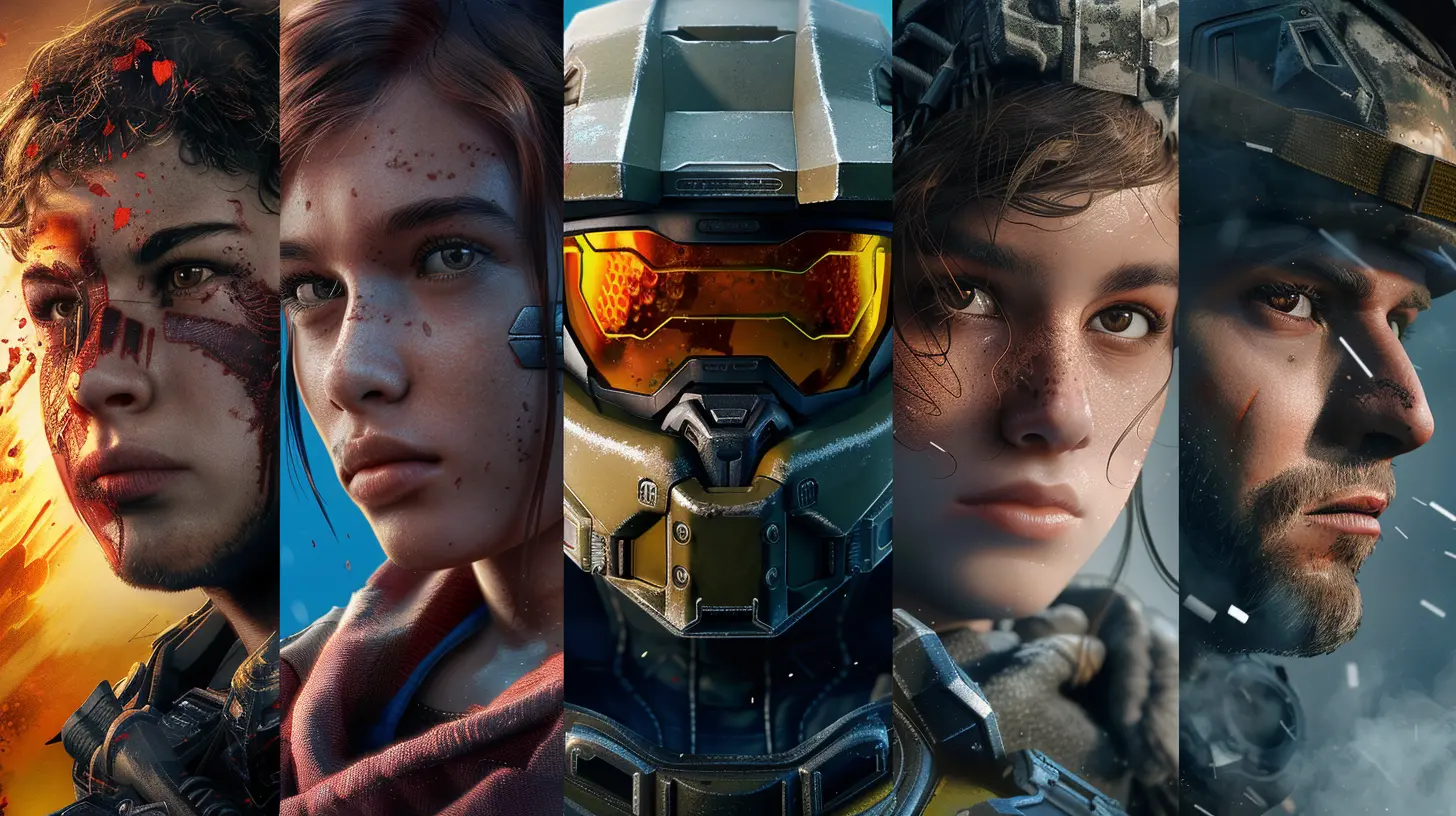Are Cross-Platform Games the Answer to Console Wars?
27 June 2025
The war has raged for decades. PlayStation vs Xbox. Nintendo vs Everyone. And let’s not forget the loyal PC master race chiming in from the sidelines. The time-honored "console wars" have defined much of gaming history. Every new hardware generation reignites the battle—fanboys draw lines in the digital sand, exclusives get waved like flags, and platform loyalty becomes a badge of honor.
But hold up. Something's changing. Cross-platform games have quietly crept onto the scene, and they're flipping the script. Shared servers, universal lobbies, and multiplayer harmony? Sounds like peace talks might finally be underway. So, let's ask the big question: Are cross-platform games the answer to console wars?
Stick around—we’re diving deep into this shift, how it’s reshaping the landscape, and whether it’s truly game over for the age-old console clash.
What Are Cross-Platform Games?
Before we tear down the walls, let’s define them. Cross-platform games, or crossplay titles, let players across multiple systems—like PlayStation, Xbox, Nintendo Switch, and PC—play together in the same game at the same time. No longer are you shackled to your console’s user base when trying to squad up.Think games like:
- _Fortnite_
- _Call of Duty: Warzone_
- _Minecraft_
- _Rocket League_
- _Apex Legends_
These titles don’t care what box you own—they just want you to play.
A Brief History of the Console Wars
To understand the impact of cross-platform play, we need to rewind a bit. The console wars began in the early '90s, most notably between the Sega Genesis and Super Nintendo. Since then, every generation brought its turf battles.Some defining moments:
- Sony’s domination in the PS2 era
- Microsoft’s surprise punch with Xbox Live
- Nintendo’s reinvention strategy with the Wii
- Sony’s exclusives reign with PS4
- Microsoft's Game Pass and cloud gaming push with Xbox Series X
Through all of this, one tactic has remained consistent: exclusivity. Console makers banked on exclusive titles as the ultimate weapon. You want _Halo_? You get an Xbox. Can't live without _Spider-Man_? You need a PlayStation. This ecosystem was built on separation and rivalry.
Enter Crossplay: A Game Changer?
Now, here’s where things get spicy. Cross-platform functionality challenges the exclusivity-driven model. It’s like opening the gates and inviting everyone into the same playground. No matter your device, you can compete, cooperate, and connect.So, what does this mean for the long-standing console war? Well, it could mean peace talks... or a new kind of competition.
Benefits of Cross-Platform Games for Gamers
Let’s not beat around the bush—crossplay is a massive win for players. Here’s why:1. Bigger Player Pools
No more dead lobbies. By merging player bases, games stay alive longer and matchmaking improves significantly. You’ll spend less time waiting and more time fragging.2. Play with Friends, Not Just Platforms
Got a buddy on Xbox while you’re rocking a PS5? It used to mean no game nights together. Now? You're squadding up without a second thought.3. Unified Progression (Sometimes)
Some games even let you carry your progress across platforms. That means your hard-earned skins and stats follow you whether you're playing on console, PC, or even mobile.4. Value for Money
You’re no longer confined to buying a game multiple times or choosing where to play it based on your friends. That’s cash saved and flexibility gained.Why Console Makers Were Hesitant to Embrace Crossplay
Let’s be real—if cross-platform is so beneficial, why did it take so long to become the norm?1. Business and Brand Loyalty
Console makers thrive on ecosystem lock-in. If your friends are all on Xbox, you’re more likely to buy one too. Letting go of that exclusivity could mean losing a competitive edge.2. Revenue Sharing
If you buy in-game content on one platform and use it across others, who gets the money? It’s a logistical headache that’s got big money implications.3. Technical Issues (Sort of)
While often cited, technical limitations are way less of a factor now. Most modern games can support crossplay—it's the politics that usually get in the way.How Developers and Publishers Are Driving Cross-Platform Growth
What really shoved cross-platform into the spotlight? Developers and publishers. Especially those who saw the massive potential of player engagement across systems.Epic Games, for instance, made _Fortnite_ a behemoth by pushing crossplay hard. It built communities, sustained massive player counts, and made so much money that platform holders couldn’t ignore the benefits.
Call of Duty, one of gaming’s biggest franchises, followed suit. So did Minecraft, Rocket League, and Apex Legends. Suddenly, crossplay wasn’t a feature—it became an expectation.
The New Frontier: Cross-Platform Progression
Cross-platform is more than just playing with friends. Enter cross-progression—the holy grail of gaming freedom.Being able to switch from your console to your PC without losing progress is a huge deal. It's becoming more common in free-to-play and service-based titles, and it’s eerily similar to how streaming services let you pause a movie on your TV and pick it up on your phone.
It’s the future—and it’s one step closer to a console-agnostic world.
What Happens to Console Exclusives?
Exclusives made the console wars worth watching. But what happens when crossplay erodes those hard borders?A few things could happen:
- Exclusives stay, but crossplay becomes the baseline. You’ll still get “must-have” titles locked to a system, but multiplatform games will unite players regardless of hardware.
- Timed exclusives become more common. Think of them as temporary bragging rights before the game launches everywhere.
- First-party developers embrace wider audiences. Microsoft's approach with Xbox Game Studios shipping titles on PC, and even some on Nintendo, is already headed this way.
Crossplay won’t kill exclusives entirely, but it might make them matter a little less.
Cloud Gaming: The Inevitable Evolution?
Let’s toss another log onto the fire—cloud gaming. Services like Xbox Cloud Gaming (xCloud), GeForce Now, and even the short-lived Google Stadia are pushing the industry toward platform-less gaming.If you can stream _Halo Infinite_ on your phone with a controller, what does it matter what console you own?
Cross-platform gaming is just one stepping stone toward a completely hardware-agnostic ecosystem—where the only thing that matters is how good your internet is.
Are We Really Seeing the End of Console Wars?
So, with all these massive shifts, are we finally saying goodbye to the console wars?Well… yes and no.
Why Yes:
- Players increasingly value access and flexibility over hardware identity.- Multiplayer titles with crossplay are setting a standard.
- Game Pass, cloud gaming, and streaming services are changing "ownership."
Why No:
- Hardcore fan loyalty still thrives (just scroll through Reddit or Twitter).- Top-tier exclusives (like _God of War_ or _The Legend of Zelda_) still sway console sales.
- Consoles remain status symbols and “home bases” for many gamers.
So, instead of a war, we might be entering a cold war—coexistence with occasional skirmishes. Kind of like how Marvel and DC fans eventually agreed that hey, maybe both universes can be cool.
What This Means for the Future of Gaming
Let’s zoom out for a second. We’re entering a gamer-first era. In many ways, cross-platform play is a massive step in treating the player base like a united community instead of segmented tribes.It’s no longer about “what console do you have?” but rather, “what game do you want to play?”
As developers lean into crossplay and cross-progression, gamers win. We’re witnessing the early stages of a fully connected ecosystem—where the universal language is the game, not the hardware.
Final Thoughts: So, Are Cross-Platform Games the Answer?
Alright, time to answer the big question: Are cross-platform games the answer to console wars?Short answer? Kind of.
Cross-platform gaming disarms the console wars. It lets friends stay connected, keeps games alive longer, and gives players more freedom. It doesn’t kill exclusives, but it makes them less of a deal-breaker.
We may never see a single “winner” in the console race—and that’s okay. Because when we can all log in, team up, and play together, maybe everybody wins.
all images in this post were generated using AI tools
Category:
Cross Platform GamesAuthor:

Greyson McVeigh
Discussion
rate this article
1 comments
Asher Good
Cross-platform games could indeed be the solution to the ongoing console wars. By allowing players from different platforms to connect and compete, the gaming community can unite, reducing fragmentation. This inclusivity fosters a larger player base and enhances game longevity, benefiting developers and gamers alike. Unity is the future!
July 9, 2025 at 4:57 PM

Greyson McVeigh
Absolutely! Cross-platform games can bridge divides, uniting players and enriching the gaming experience for everyone. Unity indeed paves the way for a more collaborative future!


